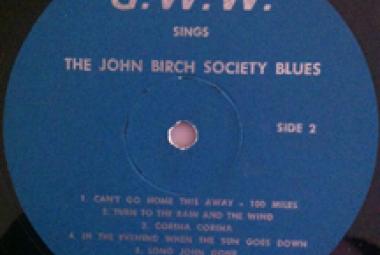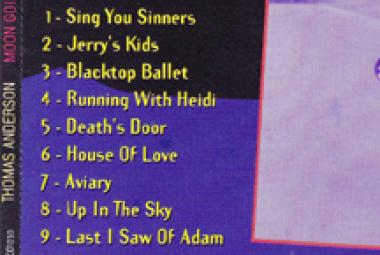“Stairway to Heaven” is a song by the English rock band Led Zeppelin, released in late 1971. It was composed by guitarist Jimmy Page and vocalist Robert Plant for the band’s untitled fourth studio album (often called Led Zeppelin IV). It is often referred to as one of the greatest rock songs of all time. The song has three sections, each one progressively increasing in tempo and volume. The song begins in a slow tempo with acoustic instruments (guitar and recorders) before introducing electric instruments. The final section is an uptempo hard rock arrangement highlighted by Page’s intricate guitar solo accompanying Plant’s vocals that end with the plaintive a cappella line: “And she’s buying a stairway to heaven.” “Stairway to Heaven” was voted number three in 2000 by VH1 on its list of the 100 Greatest Rock Songs, and was placed at number 31 on “Rolling Stone’s 500 Greatest Songs of All Time”. (More from Wikipedia)
Back in college, I would sometimes hear incredible music being played in the adjoining apartment; since I always seemed to be taking a nap or otherwise nodding off, I wondered if I was dreaming: Could there really be music that wonderful? I could tell that the artist was Led Zeppelin, and I was a freshman when I first heard their debut album, Led Zeppelin – in fact, they played a concert in Raleigh, and one of my suitemates came back raving about how great they were.
I was often in the bar near our apartment called the Player’s Retreat – a Raleigh institution that has been around since the year of my birth (1951) – and had noticed that their jukebox had a few multiple-song disks. I played both sides of the one by Led Zeppelin; and sure enough, “Stairway to Heaven” was the entire second side, and the mystery was solved.
“Stairway to Heaven” is not a Christian song by any means; quite the contrary: Despite the references to Heaven, many seem to think that it could just as easily be referring to Hell. There are even websites that purport to list out verse after verse of the “backward masking” lyrics on the song.
In my judgment, the whole “backward masking” business is nonsense; what I have heard most of the time is the main vocal track played backwards, which seems to form other words. The best example that I know of is on “Revolution 9” by the Beatles, where the frequently repeated line “Number Nine” played backwards sounds like “Turn me on, dead man” (one of the many so-called “clues” that Paul McCartney was dead). It took me a while to hear that myself, since it actually sounds more like: “Tu-u-u-u-rn me ’n, d’d m’n”. It is obvious on its face though that there is no one on Earth who could hear “Number Nine” with one ear and “turn me on, dead man” with the other ear.
Anyway, for their part, the members of Led Zeppelin say that the song doesn’t have a special meaning at all. Jimmy Page was quoted in Wikipedia as saying of the song: “The wonderful thing about ‘Stairway [to Heaven]’ is the fact that just about everybody has got their own individual interpretation to it, and actually what it meant to them at their point of life. And that’s what’s so great about it. Over the passage of years people come to me with all manner of stories about what it meant to them at certain points of their lives. About how it’s got them through some really tragic circumstances. . . . Because it’s an extremely positive song, it’s such a positive energy, and, you know, people have got married to [the song].”
I found a couple of quotes from Robert Plant about “Stairway to Heaven” on a website called enotes.com: “It [the song] was done very quickly. It took a little working out, but it was a fluid, unnaturally easy track. It was almost as if — uh oh — it just had to be gotten out at the time. There was something pushing it saying, ‘You guys are okay, but if you want to do something timeless, here’s a wedding song for you.’ . . . Robert Plant once stated that the song was ‘. . . a woman’s quest for spiritual perfection’ and ‘. . . a simple wedding song’.”
* * *
To this day, “Stairway to Heaven” by Led Zeppelin is ranked among the greatest rock songs of all time. Wikipedia notes: “As of 2000, the song had been broadcast on radio over three million times. . . . It is also the biggest-selling single piece of sheet music in rock history, clocking up an average of 15,000 copies yearly. In total, over one million copies have been sold.”
In an interesting take on the legacy of this song, Wikipedia adds: “Erik Davis, a social historian and cultural critic, commented on the song’s massive success, subsequent backlash and enduring legendary status: ‘“Stairway to Heaven” isn’t the greatest rock song of the 1970’s; it is the greatest spell of the 1970’s. Think about it: We are all sick of the thing, but in some primordial way it is still number one. Everyone knows it. . . . Even our dislike and mockery is ritualistic. The dumb parodies; the Wayne’s World-inspired folklore about guitar shops demanding customers not play it; even Robert Plant’s public disavowal of the song — all of these just prove the rule. “Stairway to Heaven” is not just number one. It is The One, the quintessence, the closest AOR [album-oriented rock] will ever get you to the absolute.”
* * *
Spirit was recently in the news when they won the first round in a long-simmering controversy with Led Zeppelin. The two bands had toured together during Led Zep’s first tour, and Randy California had long claimed that the opening chords for “Stairway to Heaven” were lifted from their 1968 instrumental song “Taurus”.
Reportedly for lack of funds, a copyright infringement lawsuit was not filed until May 2014 (by Randy Craig Wolfe’s heirs); and on October 21, 2014, the Judge in the case denied the request by Led Zeppelin’s attorneys to dismiss the case.
The Jewish Business News post mentioned above also notes that Led Zeppelin’s case is harmed by past copyright troubles: “[Led Zeppelin was] forced to emend credits for ‘Whole Lotta Love’ and ‘Babe, I’m Gonna Leave You’ as well as settling a suit over ‘Dazed and Confused’.” Not only that, I have written in the past about “How Many More Times” on Led Zeppelin, where the band had to show a writing credit for Howlin’ Wolf, who had written “How Many More Years” previously.
(November 2014)















